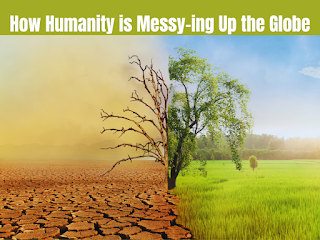"Our Footprint of Folly: How Humanity is Messy-ing Up the Globe"
It's no secret that humans have a significant impact on the environment. From the air we breathe to the water we drink, our activity leaves its imprint on every area of the world. But how deep are these scars, and are we heading for an environmental tipping point? Unfortunately, the answer portrays a bleak picture filled with harsh facts and demands prompt action.
A Crumbling Canvas: Overpopulation creates a lengthy shadow, as our constant need for resources exceeds the Earth's capacity to deliver. We're overstaying our welcome by consuming 56% of the planet's productive land, squeezing the life out of our forests, and depleting fisheries to dangerous levels. The repercussions are clear: the very ecosystems that support us are being suffocated by our insatiable demand.
Pollution's Perilous Parade: Our reliance on fossil fuels releases a poisonous mix of greenhouse gases into the sky, stoking the inferno of climate change. The Earth's temperature is rising, causing a cascade of natural effects, including melting glaciers, rising sea levels, and increasingly irregular weather patterns. This is not simply a future worry; it is already affecting us, with disastrous floods and parching droughts.
Ocean's Suffocating Symphony: Our oceans aren't immune either. Plastic chokes marine life, and chemical contaminants contaminate the very waterways that sustain us. Overfishing brings entire species to the edge of extinction, upsetting the delicate balance of marine ecosystems. Coral reefs, the vivid playgrounds of the aquatic world, are bleaching and dying, leaving behind skeletal evidence of our irresponsibility.
A banquet with a bitter aftertaste: Even our dietary choices have become environmental nightmares. Intensive agriculture depletes resources, reduces biodiversity, and pollutes land with chemical fertilizers. Livestock farming releases methane, a strong greenhouse gas, into the atmosphere, hastening climate change. This meal of unsustainable practices leaves a terrible aftertaste: land erosion, water shortages, and a future in which food becomes a weapon in the fight for existence.
The Looming Specter of Conflict: The consequences of our ecological crimes are not only environmental; they also can destabilize societies and spark conflict. The scarcity of resources can lead to fights for water, fertile land, and energy. Climate change and environmental disasters can cause mass migrations, putting social structures under strain and creating breeding grounds for unrest. Our ecological imprint is physically creating lines on a map of probable future battlegrounds.
A Time of Transformation, Not Despair: Despite this gloomy landscape, a glimmer of hope lingers. Human creativity has resulted in advancements in renewable energy, sustainable agriculture, and waste management. We have the skills and knowledge to heal the wounds we have caused. What we need is a united will, an uncompromising commitment to prioritizing the environment before short-term profits and ease.
The choice is ours: continue down the route of environmental destruction, which leads only to agony and chaos, or construct a new one marked by sustainable practices and respect for the delicate balance of the ecosystem. This is not only an environmental obligation, but also a moral one. We owe it to ourselves, future generations, and the numerous animals that live on this planet to leave a legacy of responsibility rather than disaster.
Let us face the task not with despair, but with determination. Let us change the narrative via action rather than ink. Let us be the generation that reverses the tide, mends the torn strands of our relationship with the Earth, and weaves a tapestry of hope for a sustainable future. The time for excuses has passed; the time for transformation has arrived.
If we do not act now, Earth will resemble a shadow of its former self, exhibiting humanity's destructive might. The consequences of uncontrolled industry, overpopulation, and a relentless pursuit of advancement will leave the world scarred and gasping for oxygen.
The air will become polluted, strangling the sky and casting a perpetual shadow over metropolitan regions. Fossil fuel consumption, driven by an insatiable desire for energy, will set off a relentless march toward climate change.
The consequences will be catastrophic. Melting glaciers will contribute to rising sea levels, submerging coastal towns. Unpredictable weather patterns will decimate agricultural lands, leaving once fertile soil barren and unproductive. Deforestation will become a pandemic, with vast swathes of lush flora being transformed into barren landscapes.
The consequences of environmental degradation will be seen throughout the world, with water supplies becoming contaminated and rendering us unsafe to drink. Wars will erupt over the rare commodity of pure water, generating massive migrations of desperate people seeking a ray of hope in a world that appears to be collapsing under the weight of its flaws.
89 percent of the world's environmentally productive land will be fully utilized. Farmlands, fisheries, and forests will lose their ability to provide essential ecological services. Carbon storage has declined, and creatures will go extinct as their habitats disappear.
Climate change will have a devastating impact on coral reefs, with experts predicting a 70-90 percent drop in live coral worldwide by 2050. The extinction of coral reefs loomed on the horizon, a dire forecast that would become a reality in a single human lifetime.
Will drive the food industry to produce a more industrialized and meat-centric diet, contributing significantly to the planet's doom. Large areas of land and water will be allocated to cow production, resulting in deforestation, biodiversity loss, and climate change. As the world's population expands, so will the need for food, requiring more than one-third of the world's land area and more than 75% of freshwater resources to feed the ever-increasing hordes.
To save the ecosystem from ruin, a few voices spoke up, urging humanity to change its ways before it was too late. The consequences of our actions were obvious, and the world cried out for atonement. The question of whether humanity might alter course and salvage what was left of the Earth's once-thriving ecosystems hung heavy in the air as the world faced an uncertain future.


.png)

Comments
Post a Comment